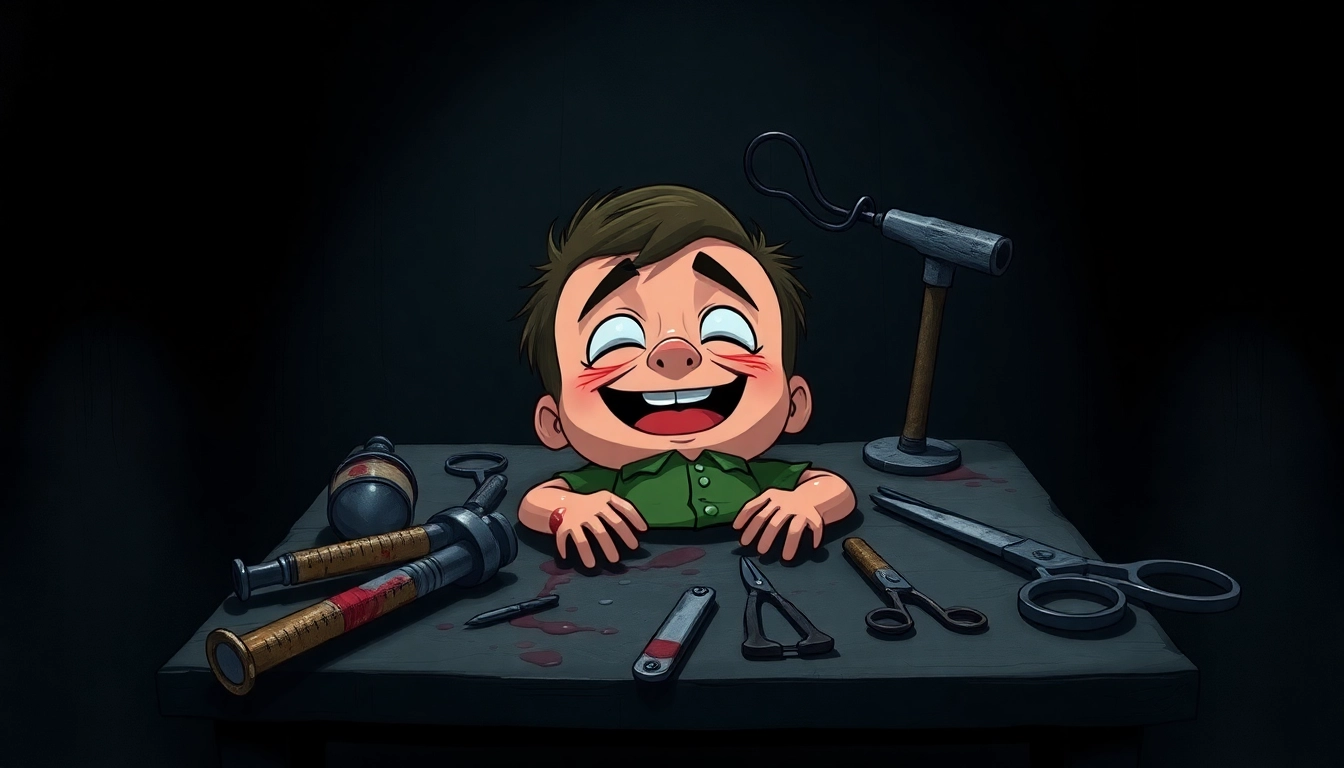Overview and Context of BloodMoney: A Dark Clicker Descent
In the realm of psychological horror and morally challenging gaming experiences, blood money game harvey stands out as an unsettling exploration of human nature, morality, and survival. This dark clicker game immerses players in a disturbing narrative where each click not only earns money but also chips away at moral boundaries, challenging players to confront the consequences of their actions amid a desperate race against time. The game’s premise is simple yet profoundly impactful: diagnosed with a life-threatening condition requiring $25,000 for treatment, players are introduced to Harvey, a cheerful character who offers a twisted opportunity to generate income through disturbing means.
The Dark Narrative of BloodMoney Game and Harvey
Introducing Harvey: The Innocent Facade
Harvey, a seemingly cheerful and innocent figure, becomes the central character through whom the game’s moral dilemmas unfold. His bright demeanor and friendly tone initially mask the dark reality of what players are asked to do. The game masterfully uses Harvey’s character as a symbol of innocence caught in a web of exploitation, raising questions about the nature of good and evil. As players click on Harvey to generate money, they witness his reactions shift from cheerful to pained, emotional, and increasingly distressed, embodying the moral weight of each decision.
Game Mechanics: Clicking, Upgrades, and Visual Cues
The core gameplay revolves around clicking on Harvey to earn a dollar per click. As the clock ticks and your medical bills remain unpaid, the pressure to increase earnings intensifies. Players can purchase upgrades from the in-game shop—ranging from simple tools like scissors and needles to more violent implements such as hammers and knives—that boost the amount of money earned per click. Each upgrade, however, comes with visual and psychological consequences for Harvey. The visuals become more disturbing, and Harvey’s reactions grow more agonized, creating an atmosphere of mounting discomfort. Subtle visual cues—such as Harvey’s changing facial expressions and dialogue—serve as indicators of his suffering, forcing players to grapple with their moral choices.
Community Insights and Player Perspectives
Players around the world have engaged deeply with bloddmoney game, sharing insights about the game’s layered storytelling and moral complexity. Many note how the game subtly tracks their choices, revealing that even using less violent tools can lead to different endings. The community often discusses the surprising depth of the narrative, with some players highlighting how Harvey’s reactions seem genuinely unaware of the true nature of the shop’s items—implying he might not fully understand what he’s facilitating. This ambiguity adds a further layer of moral ambiguity, as players question whether Harvey is complicit or simply oblivious.
Featured Gameplay Videos and the Impact of Clicking Mechanics
Watching gameplay videos reveals the visceral progression of the game’s disturbing atmosphere. As players click repeatedly, the visuals evolve from lighthearted and almost cartoonish to grotesquely unsettling. The game’s pacing and escalating violence create a visceral experience, emphasizing the moral cost of each decision. Content creators often highlight how the game’s sound design, dialogue, and visual cues work together to heighten emotional stakes, making each click more impactful. The game’s design ensures that even the most callous players may feel a twinge of guilt, especially when Harvey’s reactions become visibly more suffering.
The Upgrade System: Maximizing Profit or Minimizing Harm?
Tools of Increasing Violence
The shop offers a variety of upgrades, each designed to boost earnings. Initially, players might buy simple items like pillows or needles, which cause minimal pain. However, as desperation grows, more violent tools become available. These include scissors, needles with larger doses, hammers, and even knives. The choice of upgrades directly influences Harvey’s suffering. Some players aim to minimize harm, sticking to non-violent options, while others opt for maximum profit regardless of the human cost. This decision profoundly affects the game’s ending, reflecting the player’s moral stance.
Visual and Psychological Consequences of Upgrades
Every upgrade alters Harvey’s visual appearance and emotional state. For instance, using a hammer results in Harvey’s face contorting in pain, with subtle visual cues revealing increasing distress. The psychological impact on players is significant; many report feeling guilt and remorse, even when choosing the most profitable options. The game’s design cleverly underscores the duality of human nature—balancing greed and empathy—and forces players to confront their own morals.
Multiple Pathways and Endings: The Moral Spectrum
The Three Endings: Good, Normal, and Bad
BloodMoney features three distinct endings, each dictated by the player’s choices regarding harm and efficiency. The Good Ending is achieved by minimizing Harvey’s suffering, opting for less violent tools, and maintaining a moral stance. The Normal Ending involves moderate violence and some moral compromise. The Bad Ending results from maximizing profit at any human cost, using the most violent tools available. These endings serve as a reflection of the player’s moral compass and decision-making process throughout the game.
Pathways to the End: Strategy and Moral Decisions
Achieving the different endings requires deliberate choices. For example, selecting the scissors offers a balanced approach—earning enough money while keeping Harvey relatively unharmed. Conversely, using the hammer or knife pushes towards the Bad Ending, showcasing a complete moral descent. Interestingly, some players discover that even with violent tools, it’s possible to unlock the Good Ending by making strategic choices elsewhere, revealing the game’s subtle tracking of player behavior and morality.
The Role of Harvey: Innocence, Suffering, and Symbolism
Harvey as a Representation of Innocence
Harvey embodies innocence and goodness, serving as a mirror for the player’s moral decisions. His cheerful demeanor and naive reactions evoke sympathy, intensifying the emotional impact of his suffering. As Harvey’s appearance and reactions change, players experience a visceral sense of guilt or justification based on their choices. The game cleverly blurs the line between victim and participant, prompting reflection on whether innocence can truly be exploited for survival.
Harvey’s Surprising Awareness and the Moral Complexity
One of the most intriguing aspects is Harvey’s apparent surprise at the violent tools, like the hammer. This suggests he might not fully comprehend what he’s facilitating, which adds a layer of moral ambiguity. Is Harvey merely a pawn, or does he have some awareness of the darker purpose? This question remains open, inviting players to interpret the narrative beyond explicit storytelling, deepening the psychological horror experience.
Hidden Depths and Narrative Symbolism
The Game’s Reflection on Human Nature
BloodMoney uses its bleak narrative and visual storytelling to explore themes of greed, innocence, guilt, and moral compromise. Harvey’s character symbolizes the fragile boundary between good and evil, innocence and corruption. The increasing violence and Harvey’s deteriorating reactions serve as metaphors for the corrupting influence of desperation and survival instincts. The game challenges players to consider whether they are inherently good or evil when pushed to their limits.
Subtle Details and Symbolic Elements
Throughout the game, subtle details—such as Harvey’s changing dialogue, facial expressions, and the shop’s increasingly violent tools—serve as symbolic cues. These elements invite attentive players to interpret the underlying message: that every action, no matter how small, carries moral weight. The game’s minimalist art style and haunting soundscape further enhance its symbolic depth, creating an immersive psychological experience.
Community Insights and Player Experiences
Players have shared diverse experiences and interpretations, ranging from seeing Harvey as a symbol of innocence lost to viewing the game as a critique of human greed. Discussions often highlight how different choices lead to different emotional responses—ranging from guilt to justification. Many players report that, even when choosing violent options, they felt conflicted and emotionally impacted, illustrating the game’s powerful storytelling and emotional design. Some have experimented with different strategies, discovering that the game subtly tracks their moral stance, influencing which ending they unlock.
The Game’s Reflection on Morality and Humanity
At its core, BloodMoney questions whether humans are inherently good or evil when faced with life-and-death situations. The game immerses players in a scenario where survival demands moral compromise, forcing them to reflect on their own values. It exposes the uncomfortable truth that the line between right and wrong often blurs under extreme circumstances. The moral choices are not black and white but layered and complex, making each playthrough a unique exploration of human morality.
Conclusion: How Far Are You Willing to Go for Survival?
BloodMoney challenges players to confront the darkest aspects of human nature. The game’s haunting narrative and moral dilemmas serve as a mirror, reflecting our capacity for greed, empathy, and cruelty. As you progress, the question remains: how far are you willing to go when your life is at stake? Will you choose the path of minimal harm, or will you maximize profit regardless of Harvey’s suffering? Every decision shapes your destiny, culminating in one of three endings—each revealing different truths about morality and survival.
In this disturbing psychological journey, blood money game harvey masterfully explores the duality of human nature. It forces us to question our instincts and moral limits in a harrowing, visceral experience that lingers long after the screen goes dark. How you choose to navigate Harvey’s world ultimately defines your moral boundaries and your understanding of what it truly means to survive in a world devoid of clear right or wrong.
As with all profound stories, the game leaves us pondering: is survival worth the moral cost? The answer lies within each player’s choices, making BloodMoney more than just a game—it’s a psychological mirror held up to the darkest corners of the human soul.

